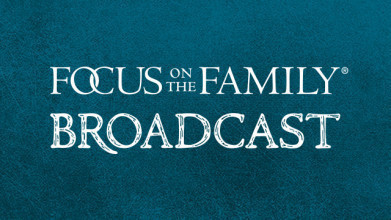Woman #1: My husband would, um, sometimes have to enter into the conversations with our four girls and would find out something they did that they shouldn’t have, and to just see the looks on my girls’ faces when they would realize they’ve been caught.
Woman #2: They wanted to play shoot ’em up video games, and we felt that we didn’t wanna expose them to that kind of violence. And so we just flat out said no. And, and that was hard for them.
Man #1: I remember butting heads with my parents whenever they asked me to do the chores and I was in the middle of something else. And so, um, I would do it, but I would do it with a bad attitude.
Woman #3: Whenever my parents and I would butt heads, usually I would just get really quiet and make a really, really angry face until we were done with the conversation.
John Fuller: Hmm, well, does that sound familiar? Uh, parent/teen communication can be so challenging, especially when you’re trying to navigate with, uh, unexpected conflicts and, uh, triggered emotions and disrespect that may not be so subtle, uh, maybe even slam doors. If that’s you, stayed tuned. We have some hope for you today on Focus on the Family. I’m John Fuller, and your host is Focus president and author Jim Daly.
Jim Daly: John, I think it’s important to acknowledge we all blow it. Uh, I, I would love to do a redo on parenting.
John: Hmm.
Jim: ‘Cause I just feel like now I’ve kinda learned the basics, and it’d be fun to start back, uh, at the beginning and-
John: At this energy level?
Jim: Yeah (laughs).
John: Or (laughs)-
Jim: Well, yeah, the energy level could be another problem. But, uh, you know, having teenagers is fun, exciting, chaotic-
John: Mm-hmm.
Jim: Stressful, uh, disappointing at times, all those things, ’cause we’re trying to control these kids into a grand future (laughs) that we have for them.
John: Indeed.
Jim: And, uh, at some point we need to learn how to let go, and that is the key. And I’m so grateful for our guest today, ’cause he has made it his passion to help parents do a better job, A, in maintaining and wonderful relationship with your teenager and future adult child, but also equipping you to manage the rough spots of raising that teenager and things we can do. So I’m anxious to get into the content.
John: Well, Dr. Ken Wilgus joins us. He has been here a number of times. He’s a psychologist, author, speaker. Uh, he has a podcast that he hosts. He specializes in adolescent behavior and has written, uh, really a landmark book. It’s called Feeding the Mouth that Bites You.
Jim: (Laughs) Great title.
John: It is a great title. The subtitle is A Complete Guide to Parenting Adolescents and Launching Them Into the World. Stop by focusonthefamily.com/broadcast for your copy, or give us a call.
Jim: Ken, it’s great to have you back.
Dr. Ken Wilgus: It’s great to be here. Thanks.
Jim: So much fun. I mean, you sit with stressed out parents every day.
Ken: Every day, yeah.
Jim: (Laughs) Counseling-
Ken: Yeah.
Jim: I mean, uh, that takes a bit of patience on your end, ’cause you probably have seen so many, uh, parents and their teens that… Y- H- How do you find something unique? ‘Cause the stories probably begin to blend and look the same and-
Ken: You know, it ends up with a lot more compassion than it used to. Parents will come to my office, especially if they’ve read the book, as if they’re going to a vice principal, you know-
Jim: (Laughs)
Ken: Like we… there’s a lot of things we’re not doing right. And, and I feel more compassion for the pressure that parents have.
Jim: Let me ask you, and then we’ll get into the book content, but that idea of formula, ’cause it pops up, and a lot-
Ken: Yes.
Jim: Of parenting experts have maybe unintentionally projected if you do a plus B, you get C.
Ken: Yes.
Jim: And my experience is it just doesn’t necessarily work out that way. What I like to say is these are things that you can do for possibilities. You know, if you do these things, there’s a greater possibility your-
Ken: Or to know that-
Jim: Child will-
Ken: You’ve been the most effective-
Jim: Right.
Ken: You can be.
Jim: But there-
Ken: But it’s not all-
Jim: No formula.
Ken: Up to you. That’s-
Jim: It-
Ken: Very true.
Jim: And I think Christian parents particularly because we lock into that-
Ken: Yes.
Jim: Like if then statements. If I do these things correctly, then I get the perfect-
Ken: Yes.
Jim: Child.
Ken: Yes.
Jim: And, uh-
Ken: And I feel like my f- As a psychologist, I feel a little guilty because it feels like my field has kind of put into that myth a lot-
Jim: Mm-hmm.
Ken: That there’s this formula. But, yeah, so when you talk about meeting with parents, I feel more compassion that calm down, you’re probably doing better than you think.
Jim: Hmm.
Ken: Uh, and, and let’s maximize that. But don’t, you know-
Jim: Yeah.
Ken: Make your results based on whether your kids turned out-
Jim: And, and I think one of the core things right now is sometimes for parents it’s just relax.
Ken: Hmm.
Jim: You know, some of this will come very naturally to you.
Ken: It’s true.
Jim: You don’t have to over-formulate it.
Ken: Yes.
Jim: You know, and, and put all this burden upon you. Just be solid, be loving, be kind, be, uh, you know, set the boundaries, follow up on those things. But it, it, it, it doesn’t take a magnifying glass-
Ken: B- No, it doesn’t. It doesn’t.
Jim: If I could say it that way.
Ken: And those of us that have done our parenting, you know full well that you did stuff you shouldn’t have done.
Jim: And they-
Ken: And-
Jim: Know it too, the kids (laughs).
John: (Laughs)
Ken: And you didn’t do stuff you should’ve done. You know, Daniel Winnicott, this old psych- uh, psychoanalyst, would talk about good enough parenting.
Jim: Yeah.
Ken: Is it good enough?
Jim: Yeah.
Ken: Which is plenty e- enough. So, you know, I feel like I, I don’t wanna add to any parent’s burden of, uh-oh, they talked today about something I haven’t been doing. That-
Jim: Yeah.
Ken: Means I’m, I’m really messing things up. That’s never the case.
Jim: Well, let’s look into the box of secrets (laughs)-
Ken: Yeah, yeah.
Jim: That you’ve talked about.
Ken: The magic stuff.
Jim: Feeding the Mouth that Bites You. By the way, did your wife, Sally, come up with this, or-
Ken: She did not.
Jim: (Laughs)
Ken: That… But, but it sounds just like her (laughs).
Jim: (Laughs) It’s a clever title-
Ken: Yeah.
Jim: Because so many parents feel like that. Look at what I’m doing for this teenager, and this is the thanks I get?
Ken: That’s how parents always react. They’re like, uh, that is so it.
Jim: So the title fits it. In the book… Uh, and really you’re concentrating on parent/teen communication. And in the book you go to great lengths talking about this concept of planned emancipation.
Ken: Right.
Jim: For your teenager. And, uh, you know, we engaged you, Jean and I, ’cause we’re struggling with Trent. And Trent knows, so I’m not letting something out of the bag. He was just, um, a strong-willed kid.
Ken: Trent was doing fine.
Jim: And he actually, he was (laughs).
Ken: We’re good.
Jim: It was Mom and Dad that were struggling.
Ken: Poor guy.
Jim: But in that context, um, describe what planned emancipation is and then how do you apply it?
Ken: Well, it’s just recognizing that what we think of as teenagers is brand new stuff, about 110 years ago, and, uh, your teenager, 13 and up, has always been known as young adults. If you’re old enough to have your own baby, then you’re not really a baby. You’re a young adult that needs guidance, uh, for several more years. But planned emancipation is getting ahead of the curve, uh, finishing, uh, c- with… keeping your eye on the finish line really. And then orderly retreat out of your teenager’s life. Rather than them yanking f- control from you, you actually announce early on these are the things that we are not going to be controlling, you answer to yourself and God about.
Jim: Yeah, and, uh, and we’re gonna get into all of that-
Ken: Mm-hmm.
Jim: So don’t think we’re skipping by. We’ll come back and get very specific examples. But let me move into this issue of control. We laughed about it at the beginning.
Ken: Right.
Jim: But, uh, again, I think Christian parents particularly, we struggle with this because we want an outcome, a preconceived outcome of what this experience is gonna be. It’s gonna be this angelic 20-something who is a five-star rated athlete, perhaps a scholastic genius.
Ken: Right.
Jim: 4.2, going to Harvard or, you know.
Ken: Yeah.
Jim: I don’t know.
Ken: And, and I have those parents-
Jim: (Laughs)
Ken: And they’re still not totally happy. It could be 4.3, you know-
Jim: Right. Right. And it, it does come down to this control issue.
Ken: Yes.
Jim: And we tend to, as parents… And I experience this myself, so I’m speaking only about me. I would tend to treat Trent and Troy when they were six and eight like when they were 14 and 12.
Ken: Right, right, right.
Jim: And I, I think that’s part of it, is… And it’s a hard challenge for parents to age your parenting technique.
Ken: Hmm. Yes.
Jim: With your children.
Ken: Yes.
Jim: So even the other day, I mean, Troy… I said, “Hey, Troy, man, you might wanna jump in the shower.” Uh, he’s a, he’s an older guy now.
Ken: He, he’s a man.
Jim: And he gave me the eye-
Ken: (Laughs)
Jim: Like, Dad are you serious? I was planning to do it. And it’s a little embarrassing. So I sent him a note, even this morning, I sent him a note saying, “Man, I’m so sorry I said that. That’s really your domain. That’s not my domain.” And-
Ken: But you do that to be more effective when you are clearly not trying to control at a point when you shouldn’t be.
Jim: Right.
Ken: You’re more effective when you say I’m sorry if that came across that way, not less effective.
Jim: Yeah.
Ken: But usually the most cont- None of us wanna be over-controlling. We’re afraid.
Jim: So speak t-
Ken: And that’s what we end up doing.
Jim: Speak to some of those examples of control where you’ve seen parents just struggle with letting go. What does it look like, so we can self-assess as we’re listening to you? Oh my goodness. I am that parent.
Ken: Uh, well, with the current w- way that parents are doing younger children, there’s a lot more f- uh, freedom allowed. You know, instead of picking up a spoon to spank this kid, you pick up your phone and video how cute that they drew on the wall. And so there’s a lot more flexibility than there used to be, which is, ends up being kind of reversed because now, then you get 13, 14, “Can I spend the night?” “Uh, no, no, no.” “Well, I could when I was eight.” “Yeah, well, we’re gonna shut back down.” So you end up controlling more because there’s a lot scarier things-
Jim: Safety concerns.
Ken: Absolutely.
Jim: Yeah, yeah.
Ken: Which is a realistic thing. But if you don’t put that in context, it’s easy for teenagers to feel like wait a minute, I’m getting less freedom now than ever. You’re not letting me do anything. And so that comes up in trying to control, uh, friendships, trying to control even what you think. Uh, speechmaking is definitely, uh, one of my favorite ways of doing, which all three of my children have made sure that I knew that yes, I made speeches.
Jim: (Laughs)
Ken: Um, but-
John: Are lectures not effective?
Ken: They are… They… Turns out-
Jim: (Laughs)
Ken: ‘Cause I liked mine.
Jim: (Laughs)
Ken: Parents will be in my office going, “And then they’ll say, so I said…” and I’ll interrupt going, “And so what’d your kid…” And they’re like wait, wait, wait. And they-
Jim: (Laughs)
Ken: Finish their own speech. And I get it, like yeah, I liked mine. But as my middle daughter famously said on my podcast, “Daddy, I remember that you made speeches. I don’t remember anything you said in your speeches.” So-
Jim: Wow.
Ken: That, that… And she was our, you know, compliant one. It’s like-
Jim: Yeah.
Ken: Even you don’t remember the outline of my… You don’t? So… But you try to control thought that way.
Jim: Yeah.
Ken: And, and it ends up, especially with teenagers, it’s ineffective-
Jim: Yeah.
Ken: Because you’re, you’re not addressing the issue of who is in charge of this thing?
Jim: Ken… Uh, a really important question here, I think for, especially, again, Christian listeners, ’cause the book, you’re coming at it from a very, uh, scientific approach-
Ken: Yeah.
Jim: Uh, without a, uh, uh, not a lot of Christianese, which I appreciate. But when you do the overlay, what God is about and all this, um, what are we learning as a parent as we lose control? I mean, God gives us these same freedoms, right?
Ken: Yes, yes.
Jim: And that’s with such an amazing analogy. This is exactly what the Lord does with his children.
Ken: And having been through p- I’ve been through points when I wished God didn’t give me as much freedom.
Jim: (Laughs) Yeah, right.
Ken: I mean, I really would have been happy to be zapped.
Jim: Yeah.
Ken: But he doesn’t. And it really adds to the, the knowledge that God doesn’t have grandchildren. All of us face God directly. And the idea that… One of the most painful ones is having a child that is not a believer and really feeling like that has something to do with me as a parent. And it does not. You know, Jesus was very clear that no one comes to the Father, except… to me, except the Father draw them.
Jim: Hmm.
Ken: It is a, a one-to-one. Each of us deals with God. And that issue of control, um, has taught me a whole lot about, uh, my relationship with God and how we each are, are… that’s our responsibility. And I think that’s a hard one, because we want so much to drag our children at any age to the throne of grace.
Jim: Yeah.
Ken: And you can’t.
Jim: And it’s such a… I think the control issue is kinda of the core issue in so many ways.
Ken: In so many ways.
Jim: And then it opens up other things. In fact, you said in the book handing over control typically opens up communication and makes communication better. How have you seen that work? And, and why do we struggle with that as parents, believing? It’s kinda like, uh, the opposite-
Ken: Yeah.
Jim: Is true.
Ken: Yeah.
Jim: And it… I’m sure you struggle with convincing parents, hey, listen, you give up certain control with responsibility, you’re gonna be amazed at how better the communication is. And they’re going you gotta be crazy.
Ken: Yes.
Jim: All the person… All that teenager says today is whatever.
Ken: Whatever.
Jim: (Laughs)
Ken: Well, usually th- they often don’t even believe you. So sometimes you’ll think about handing over control, um, by just kinda being nicer and not saying too much and that you really need to be clear about, uh, for example, “Your friendships are your choice, who you think you need to hang with is up to you. I don’t… I can’t guarantee I like who you hang with, but we are not gonna to be trying to control it.” You wanna be super clear about that so that, for example, in that case you can say, “Um, are you sure that this is a good guy to hang out with? You guys seem to get into trouble a lot?” “Well, he’s a good pers-” “Uh, I’m not saying you can’t. It’s up to you, but it worries me.” Those kind of examples… Once you’re clear that, “I’m not-
Jim: “Trying to control you.”
Ken: “About to tell you what to do”-
Jim: Yeah.
Ken: Uh, yeah, then it’s very powerful. The kids are, uh, more honest. Listen, even getting your teenager to talk about school without thinking that you’re a cop-
John: Mm-hmm. Yeah.
Ken: Uh, you know, “How d- how’d it go today?”, meaning let me review your day, um, y- you really have to be very clear. At this stage we’ve told you that’s up to you. Uh, there’ll be consequences for poor grades, but we’re not managing that anymore. Things like that, if you’re clear with it, that we are not controlling it, it is a little bit like giving oxygen to young adults that, uh, c- often feel like they’re being choked out, uh, and because th- I need to know am I gaining freedom here? But not all freedom, because it also makes it easier… And this is particularly true today with phones. Parents have to do a lot of, “Nope, you cannot have that phone in your room.” That comes up all the time.
Jim: Yeah.
Ken: It’s easier to say no to that if they believe you that, look, the answer isn’t no. It’s not yet, because everything will be in your control-
Jim: Yeah.
Ken: At this point. And that eases even the hard stuff you have to do-
Jim: Yeah.
Ken: Uh, like limits and curfew and all these things if they know that we’re on our way out.
Jim: Jean was really good with that, the phones charged in the kitchen at night and nobody brought ’em to the table. They went, you know, upon the counter away from everybody.
Ken: Yeah, that’s really good.
Jim: Those are… But again, back to our opening discussion. These are just kinda basic things that if you do ’em are very predictive of a good outcome-
Ken: It makes it easier-
Jim: Not absolute-
Ken: Right, right.
Jim: But it makes it easier. Ken, in fact, uh, I think the producer got a story from you about a 14-year-old girl who, uh, did a little bullying, I think, online. She was a little mean towards somebody.
Ken: Was texting. Yeah.
Jim: And the girls jumped on her.
Ken: Yes.
Jim: Explain how you coached the parent when-
Ken: Listen, y- you know, there’s so many examples where something really bad has happened, and we must help our teenager here. And one of the common ones is if you have a kid with ADHD. They’re impulsive, and they’ll say stuff they shouldn’t say. Uh, they don’t really see it coming. And if it’s a girl, it’s really hard. So one example was a 14-year-old ADHD girl who had texted in a group text something that was much meaner than she intended. It was very inappropriate. And parents were careful to not jump in and, um, control all that, but they really did walk with… They let her know, “Look, how you deal with your friends, you’re too old for us to… We wish we could help you with this or, or fix it for you, but what are you going to do?” And they ended up kind of walking through as, um, advisors. And by the end of it, she was sending her dad texts, like screenshots of these texts asking, “Hey, what should I say to this?”, like looking for their feedback.
Jim: Getting the advice.
Ken: That’s right, because that’s the opposite of the most common, which is because this is too bad and too much risk, we’re gonna step in and control that. And the teenager then, you know, will delete texts. I’m not gonna even let you know what’s going on.
John: Mm-hmm.
Ken: That’s a very common thing to do.
John: Yeah, I’ve had to tell one of my kids, “I can’t help you if I don’t know about it.”
Ken: That’s right.
John: “So if you bring things to me, then I can maybe be involved to help you.”
Ken: Which is such a better uh, uh, message than, “Look, I can find out everything that’s-
John: No (laughs).
Ken: Going on.” No, you can’t.
John: No (laughs).
Ken: Just say it out loud. No, you can’t.
John: This is Focus on the Family with Jim Daly, and, uh, our guest today is Dr. Ken Wilgus. Uh, he’s written a great book, Feeding the Mouth that Bites You. And, uh, we’ve got copies of that here. You can find that and other helpful resources at focusonthefamily.com/broadcast.
Jim: Ken, let me come back, uh, to the dialogue, uh, between a teen and a parent, kinda day-to-day stuff.
Ken: Yeah.
Jim: So often at that time, they seem highly distracted, I mean, especially if they’re looking at their phone or they’re coming back from practice or whatever they’re doing. And you’re, you’re saying, even without the inquisitory tone, you know, “H- How’d your day go?” “Uh, fine.”
Ken: Yeah.
Jim: “It was good.”
Ken: Oh, yeah.
Jim: And you get all these one-word, maybe one-word answers, so the whatever or, you know, that kinda thing. What kind of tools do you equip parents to go-
Ken: Mm-hmm.
Jim: Okay, let’s get a little deeper. How do we create a little more back and forth together-
Ken: You can.
Jim: I can?
Ken: How do I do all I can to… And I think your first step is to do a brief assessment, like what’s the problem here? Uh, communication problems are not always the same. The most common is c- like we said, control. Uh, that’s where we get this, um, almost just prejudice, the assumption that that’s the way they all are. Good morning. No, it’s not. That’s… If they feel over-controlled, that’s common, but sometimes when you’re really looking for more feedback, um, like on a deeper level, like, well, how did you feel about them, um, you know, still snapping after you left and th- uh, that? You may have a kid who’s emotional maturity isn’t that great. There may be a big kid. He’s playing football, but if, if he’s talking to his friends and still grunts and, you know, yeah, and whatever, it’s not like it’s, there’s some technique that you’re doing wrong that’s keeping him from saying, “Well, Mom, I do feel sometimes-
Jim: (Laughs)
Ken: “Deeply, you know, disturbed.” It, it’s just that’s how he is.
Jim: Yeah.
Ken: So that’s, uh, not necessarily a big communication problem. It depends on what you’re expecting from them.
Jim: Yeah.
Ken: That’s a common one.
Jim: And sometimes, uh, one of the things that I learned was more open-ended questions where they had to fill in blanks.
Ken: Sometimes they’re not good at that, and you almost do better to give them a, a multiple choice question.
Jim: (Laughs) Right. That’s-
Ken: “Are you looking forward to it? Are you a little-
Jim: Right.
Ken: “Medium about it? Or-
Jim: Yeah (laughs).
Ken: “Are you really d-
Jim: A, B, or C.
Ken: And that’s-
Jim: (Laughs)
Ken: You know, but that’s kinda where they are. And so-
Jim: But I-
Ken: It depends on what that issue is.
Jim: Yeah, and I like the idea to just keep trying.
Ken: Yeah, yeah.
Jim: Don’t give up.
Ken: Yeah.
Jim: You know, ’cause I think frustrated parents can just like pull back.
Ken: Mm-hmm. And, and just take it easy.
Jim: Yeah, yeah.
Ken: You’re doing fine.
Jim: Uh, another big issue is privacy. And this, uh, especially in the teen years, this is such a fine balance for a parent, ’cause you have the protection mode. You’re trying to loosen control. Yet, you know they could be making bad decisions. So, uh, uh, you know, you’re trying to figure out, you know, two drops of privacy and one drop of boundary and (laughs) yeah. So speak to the privacy issue in terms of h- how much emancipation for privacy do you give them without knocking on the door like, “What’s going on in there? I smell something funny like rotten food.”
Ken: (Laughs) Well, it-
Jim: Or-
Ken: Yeah.
Jim: Or something worse.
Ken: Or something worse.
Jim: Yeah.
Ken: Um, you know, I think a lot of that is, uh, I would think of it less about a balance of stuff, ’cause that’s talked about a lot. I think it’s more about territories of stuff, being realistic. Do I… For example, when it comes to communication, uh, it is not a gracious thing to remind your teenager and yourself that, “I cannot make you talk to me, uh, about things that are important if you don’t want to.” That’s not a technique. That’s just true. What’s different, though, is teenagers need to know do you know that? Does my parent know-
Jim: Mm-hmm.
Ken: That you can’t make me? And the other one, getting to privacy, a lot of times it’s also important to be careful about, uh, trust. If your teenager does share something with you that’s pretty deep, uh, they need to know that that’s not gonna be announced at the next, uh, family reunion or-
Jim: (Laughs)
Ken: Just talked about or thrown on the, uh, prayer request line. Uh, they need to be able to know that… With some exceptions, they need to know that, uh, where’s this, you know, information coming to or going to? ‘Cause as you know, teenagers are very private. And so being clear about that. But a lot of it is more being clear about what areas you’re, you are in fact still able to control and what areas you’re not and making sure your teenager knows that you know that, “I can’t make you talk to me.” Uh, much of the time, what parents are trying to do when they’re lecturing is just giving advice. And advice-giving is better done by s- announcing it first, “Hey, this is up to you, and you probably don’t agree with me, but…” And then you throw in that middle part.
Jim: Yeah.
Ken: And then you end up with, “But, listen, if you don’t wanna do that, if you think that’s silly, that’s up to you.” That makes it clear that what I’m telling you is not something I’m trying to control. And it makes it a lot easier for teenagers to hear you.
Jim: You know, one of the things I struggle with, and, especially even if you go to marriage counseling and, and even parenting help-
Ken: Yeah.
Jim: It, it… The beautiful way of setting up a feeling that you’re having or a concern that you have. And when you’re in that training mode, when you’re hearing experts talk about it, it sounds so, yeah, that makes sense. “Honey-
Ken: Mm-hmm.
Jim: “I’ve been observing lately that we’ve got a little friction.”
Ken: (Laughs)
Jim: And it sounds so good. For me, it pops out like, “Jean, why do you keep doing that?”
Ken: Yeah, I know. We never do that stuff well (laughs). That’s exactly right. Use odd statements.
Jim: But when we’re talking to experts-
Ken: Yeah, yeah, yeah.
Jim: It sounds so good-
Ken: Yeah.
Jim: To your teen. “You know, hun, you don’t have to listen to this advice, but let me… If I may-
Ken: Yeah.
Jim: “Can I share a little wisdom with you?”
Ken: (Laughs)
Jim: “And would you be willing to at least listen to it?”
Ken: (Laughs)
Jim: That sounds so great.
Ken: It does.
Jim: It never comes out that way.
Ken: Especially if you’re scared, it doesn’t soun- it’s not gonna come out that way.
Jim: So how do we train ourselves as parents to take that deep breath, say those great setup lines that hopefully we believe and then deliver that tidbit that we think they’ll benefit from?
Ken: I think it starts with do you believe it? I really do. It’s, uh, it’s not a small thing. I’m not kidding. No time around the planet ever thought of a 14, 15, 16-year-old as a child.
Jim: Yeah.
Ken: And so, again, it’s not a technique. It’s a reality of recognizing that-
Jim: Mm-hmm.
Ken: This is a young, impoverished, uh, you know, not very experienced adult. And you… Mostly if you have friendships, you’re not gonna say to your friend, “Listen, there’s a few things I think you need to hear here.” I mean, you’d start with, especially men, you know, men start with, uh, apologetic like, “Jim, it’s none of my business, dude, but-
Jim: Yeah.
Ken: You know what I mean? That’s how we do it.
Jim: That’s really true.
Ken: So I think a lot of it is if you recognize the reality that you are talking to a young adult, it can be less technique-y, uh, ’cause-
Jim: Yeah.
Ken: We’re the same as you. We didn’t, we didn’t do, follow formulas very well.
Jim: Yeah.
Ken: And just spoke right up.
Jim: Let me a hit a couple more. Uh, and if we can, we’ll come back tomorrow and pick the conversation up-
Ken: Sure.
Jim: ‘Cause it’s so much great content. This is, honestly, uh, I feel like your approach, this book helped us in a parenting probably more than anything else.
Ken: Mm-hmm.
Jim: So I’m a big enthusiast for this. And, and I just want more parents to be equipped in this way. And it really, really turned our relationship around with Trent. It was just beautiful to watch it happen.
Ken: Mm-hmm.
Jim: And it was quick. I mean-
Ken: Yeah.
Jim: Once we let go, Trent turned right toward us. And it was great. Um, you urge parents and teens to learn how to disagree. That’s, uh, that’s interesting given politics and-
Ken: Uh.
Jim: Campus issues and-
Ken: Right.
Jim: Everything going on. For a parent to say, “I’m okay with you disagreeing with me,” feels odd.
Ken: Like can feel even uncaring, like “I, I think what you’re saying is wrong. It’s ungodly. I’m not gonna say that’s okay.” Well, again, that gets back to recognizing the reality that you cannot control your teenager’s thinking, and so you’re agreeing to disagree, which is only saying, “I get it that you don’t think I, like I do, and I don’t think like you do, and that just has to be.” It’s not even so- Again, to say, “I’m not okay with that,” is a little foolish, because w- what are you gonna do about it?
Jim: And let me ask you in this regard, ’cause so much of culture seeps into us and into the church. How capable are we today versus 100 years ago? Not that you have data-
Ken: (Laughs)
Jim: From 100 years ago.
Ken: Almost.
Jim: But, but that idea of being comfortable with disagreement. It’s like today we kinda have to line up politically, culturally, and then we’re friends, or then we’re, you know, good Christians.
Ken: Yeah.
Jim: But that’s not, you know… There is disagreement on some things.
Ken: Which is a big part of why this is more important than ever. You really… Y- Say you’ve got a kind of a soft-hearted 17-year-old that doesn’t seem to disagree with much and is going along fine. That’s not okay. Our teenagers have to be prepared-
Jim: Yeah.
Ken: To deal with a world that really thinks that we’re nuts. And so part of agreeing to disagree includes inviting teenagers into, “Hey, what do you think? You know that I happen to like when our pastor preaches like they did this morning, but, dude, do you even… What do you think?”
Jim: “Does it connect?”
Ken: Like it, it’s just reminding or letting your teenager know I get it that you may think differently from, ’cause, oh, I hate when a teenager’s in my office saying… You know, I’m like, “So what are you praying for?” “Uh, oh, I’m not a Christian.” “Oh, well, you’re the leader of your church’s worship team. I thought, I thought that meant…” “Yeah, don’t tell my parents because they’ll be real upset.” Well, that’s the most ineffective kind of parenting, that you wanna know what your teenager disagrees with.
Jim: Yeah.
Ken: And-
Jim: Mm-hmm.
Ken: I’ll bet you 10 bucks what they disagree with is what they think is, is non-a- in, accepting-
Jim: Yeah.
Ken: Of other people. And you have to be able to really say, “Hey, I get it that you may not agree with this, and that… I wish you did, but I can’t change that.”
Jim: And then the challenge for us as parents is to give the Lord and the Holy Spirit time to work.
Ken: And trust him.
Jim: (Laughs) We want-
Ken: For a ch- I know.
Jim: The add water and, wow, they’re-
Ken: Instant. Yeah.
Jim: Going to Bible study and-
Ken: That’s right. That’s right.
Jim: I mean, we are so impatient when it comes to spiritual development, right?
Ken: Yeah. And we don’t… You can’t trust the Holy Spirit with these things. Yeah. It’s ridiculous.
Jim: In reality it’s really hard to do that.
Ken: Yeah, let’s get real. Yeah. Oh, yeah, yeah, yeah.
Jim: Ken, this is so good. And I said it, and I’ll say it again. Uh, great material. Fantastic ideas. And you’re equipping parents to really do the job of emancipating their teenagers-
Ken: That’s right.
Jim: And not holding on to childhood into their 20s and 30s, which is a big mistake. So let them have authority in those teen years, which you described so well in the book, Feeding the Mouth that Bites You. Let them also have the responsibility for that authority. And we’ll get more into that next time. So thanks for being with us.
Ken: Enjoyed it.
Jim: So appreciate it. And if you wanna be part of the ministry, just send a donation of any amount, and we’ll send you a copy of Ken’s great book, Feeding the Mouth that Bites You as our way of saying thank you for being part of the ministry. Those proceeds go right back into helping people. We’re not paying shareholders a profit here. So, uh, do it that way. And if you can do it monthly, it really helps.
John: Yeah, we appreciate your generosity, which allows us to reach around the world and offer help like this to parents and, uh, to families. Uh, donate generously as you can when you call 800, the letter A and the word FAMILY, or stop by focusonthefamily.com/broadcast to learn how to donate and get copies of this book. Another great resource we have that we’d like to tell you about is our Age and Stage e-newsletter. Yeah, every week we can provide you with trusted parenting advice, tailored to your child’s age. If you’d like to stay in the know about what’s happening in today’s culture and how it impacts your child, uh, these weekly newsletters will really give you the answers you’re seeking. Sign up for this free Age and Stage newsletter at focusonthefamily.com/broadcast. On behalf of Jim Daly and the entire team, thanks for joining us today for Focus on the Family. I’m John Fuller, inviting you back as we once again continue the conversation with Dr. Ken Wilgus and help you and your family thrive in Christ.




















